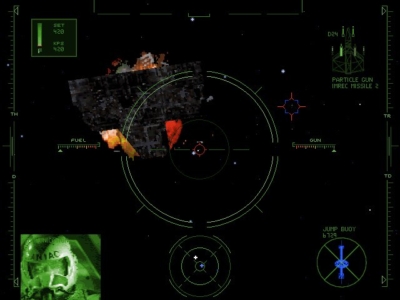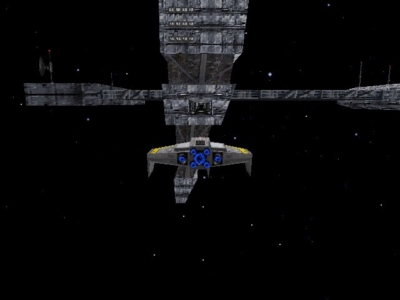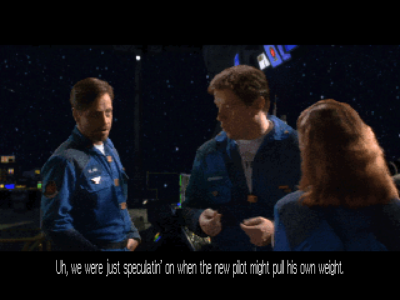
Wing Commander 3 and 4
Written by: Rik
Date posted: June 5, 2001
- Genre: Simulation
- Developed by: Origin Systems
- Published by: Electronic Arts
- Year released: 1994-95
- Our score: 8
Hmm – this is an interesting one. The Wing Commander series, both commercially and (at the time) critically, is one of the most phenomenally successful in PC gaming history. Throughout the 90s (yes, we can now talk about them retrospectively – sigh) the games kept on coming, getting progressively bigger-budget as they did so (apart from Prophecy – but we’ll get onto that), culminating in an ill-advised straight-to-video WC film a couple of years ago. So, you may ask (or not, but keep reading anyway), why does it warrant an appearance on a site of this nature?
Well, the answer is that time has not exactly been kind to Wing Commander. The series suffered a bit of a critical backlash around the time of the release of the fifth and final game, Wing Commander: Prophecy, which was coded by a brand new development team missing, most significantly, the series’ founding father Chris Roberts. Word was that the new game would eschew the Hollywood production ethos of the previous two games to concentrate on producing a game that played well. This was, of course, complete bollocks, essentially being an excuse to cut costs on the video sections of the game whilst slapping the WC name on a hollow space shooter that felt markedly out of synch with the rest of the series. But the journos lapped it up, ridiculing WCIII and IV with the inevitable jokes about Mark Hamill’s career, and some even tarring them with the dreaded ‘interactive movie’ brush, coming as they did at the advent of widespread CD gaming which saw the likes of Megarace, Phantasmagoria and The 7th Guest unleashed on an unsuspecting public.
And all this was rather unfair, for a number of reasons, but primarily because they were bloody good games that are still well worth a play now. Moreover, the much-derided movie sections were an integral and thoroughly enjoyable part of the playing experience, with Hamill, McDowell, and Biff from Back to the Future all coming across as convincing characters within engrossing storylines in a well-realised game world.
Games three and four are undoubtedly the triumphant high-point of the series, and it’s those that we’re really dealing with here. It would take quite some effort to get either of the first two running on most everyday PCs, and even then it’s probably not worth it, [Edit: For more on these games, go here]. though the storylines are still fantastic: playing WC2 with the cheats on all the way through just to watch the animated cut-scenes (yes, I have) is still about ten times more enjoyable than watching Wing Commander: The Movie. As for Prophecy, it isn’t really Wing Commander: the whole feel of the thing is wrong. For a start, the new enemy (some form of insectoid race) is not elaborated upon nearly enough; the ships, costumes and sets are all unrecognisable, as are the cast of D-list actors that appear in the two-location cut-scenes, and even cameos from old favourites such as Hamill fail to make it feel like part of the series [Edit: And for more on Prophecy, go here].
WCIII: The Heart of the Tiger had been in production for years and represented a giant leap forward for the series. Not only were the animated cut-scenes replaced with FMV clips, but the combat sections were now rendered in fully-textured 3D. It was the last game to feature the Tony-the-Tiger-a-like enemies, the Kilrathi. Essentially second-rate Klingon rip-offs, in that they spent a lot of time talking about honour, their transition from animation to live-action is perhaps the least successful aspect of the game. Nevertheless, the culmination of long-running hostilities between them and the human race makes for a thrilling story, within which various sub-plots regarding your relations with crewmates keep the player entertained from mission to mission. Although interaction is mostly limited to selecting a pleasant or rude reply in conversation, occasionally a more significant choice is presented which affects the main storyline and mission structure.
Although the combat is hardly complex stuff, it’s still enjoyable, and there’s a reasonable variety of missions, with objectives frequently changing according to twists in the plot. We’d seen it before then, and better since, but it’s still very well done, and with the musical score in the background and frequent communication with your wingmen (and enemies), the combat and cut-scenes blend in well together.
Wing IV was essentially more of the same, but bigger and better. With the Kilrathi out of the picture, a new conflict arises, this time from within the human race. The story this time is fantastic, evolving from the simple ‘brave human underdog battling powerful warrior race’ into one where the good and the bad are not so easily separated and which always keeps you guessing. The mission structure is also improved, giving the player a choice of mission, or different ways of approaching the same objective, giving greater scope for ground missions, used only sparingly and towards the end of Heart of the Tiger. Unfortunately this variety often means that demands of the game engine were made that it couldn’t deal with, thus giving the combat an occasionally clunky feel which does take the professional sheen off things somewhat. However, despite this, WCIV remains the best game in the series, and for my money one of the best space-combat experiences ever.
We’ll probably never see the likes of Wing Commander again; the series is well and truly dead, with all chances of a sixth game disappearing the moment Prophecy failed to hit the mark. In any case, in today’s network-Quake-crazy environment, you’d have to be mad to spend money developing a single player space-combat game with copious amounts of FMV. It’s a shame, which is why we’re recommending you go back to the originals, although it’s fairly unlikely you’ll be able to play WCIII and IV unless you have a mid-range Pentium that still runs DOS (and even then you’ll probably have to fiddle about with your startup files to get it going). But even so, as brave and rewarding single-player experiences, they deserve a revered place in gaming history.
[Note: This was one of the first reviews I ever wrote for the site (as you can probably tell) and though it’s a bit rough around the edges I’ve resisted the temptation to change it over the years. However, when I wrote the other WC reviews I decided to add a bit to it with a few extras. So the review is from 2001 and the extras from 2005, which may account for any discrepancies in tone between them. Just in case you were wondering.]





 Posts
Posts